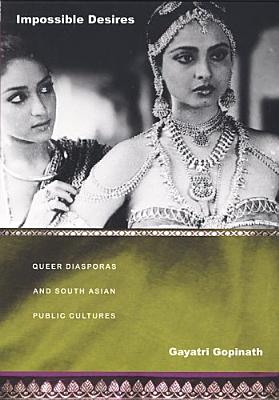Impossible Desires: Queer Diasporas and South Asian Public Cultures

Impossible Desires: Queer Diasporas and South Asian Public Cultures
Gopinath juxtaposes diverse texts to indicate the range of oppositional practices, subjectivities, and visions of collectivity that fall outside not only mainstream narratives of diaspora, colonialism, and nationalism but also most projects of liberal feminism and gay and lesbian politics and theory. She considers British Asian music of the 1990s alongside alternative media and cultural practices. Among the fictional works she discusses are V. S. Naipaul's classic novel A House for Mr. Biswas, Ismat Chughtai's short story "The Quilt," Monica Ali's Brick Lane, Shyam Selvadurai's Funny Boy, and Shani Mootoo's Cereus Blooms at Night. Analyzing films including Deepa Mehta's controversial Fire and Mira Nair's Monsoon Wedding, she pays particular attention to how South Asian diasporic feminist filmmakers have reworked Bollywood's strategies of queer representation and to what is lost or gained in this process of translation. Gopinath's readings are dazzling, and her theoretical framework transformative and far-reaching.
PRP: 259.94 Lei
Acesta este Prețul Recomandat de Producător. Prețul de vânzare al produsului este afișat mai jos.
207.95Lei
207.95Lei
259.94 LeiLivrare in 2-4 saptamani
Descrierea produsului
Gopinath juxtaposes diverse texts to indicate the range of oppositional practices, subjectivities, and visions of collectivity that fall outside not only mainstream narratives of diaspora, colonialism, and nationalism but also most projects of liberal feminism and gay and lesbian politics and theory. She considers British Asian music of the 1990s alongside alternative media and cultural practices. Among the fictional works she discusses are V. S. Naipaul's classic novel A House for Mr. Biswas, Ismat Chughtai's short story "The Quilt," Monica Ali's Brick Lane, Shyam Selvadurai's Funny Boy, and Shani Mootoo's Cereus Blooms at Night. Analyzing films including Deepa Mehta's controversial Fire and Mira Nair's Monsoon Wedding, she pays particular attention to how South Asian diasporic feminist filmmakers have reworked Bollywood's strategies of queer representation and to what is lost or gained in this process of translation. Gopinath's readings are dazzling, and her theoretical framework transformative and far-reaching.
Detaliile produsului










